Related Research Articles

John William Heisman was a player and coach of American football, baseball, and basketball, as well as a sportswriter and actor. He served as the head football coach at Oberlin College, Buchtel College, Auburn University, Clemson University, Georgia Tech, the University of Pennsylvania, Washington & Jefferson College, and Rice University, compiling a career college football record of 186–70–18.

The Third Saturday in October is the Alabama–Tennessee football rivalry, an American college football rivalry game played annually by the Crimson Tide of the University of Alabama and the Volunteers of the University of Tennessee. The respective campuses are located approximately 310 miles (500 km) apart. It is known as the Third Saturday in October because the game was traditionally played at such date prior to the 1992 football season, when the Southeastern Conference (SEC) split into its East and West divisions. From 1995 to 2015, it was only scheduled for that date six times, though it was again scheduled for that date from 2016 through 2019 and in 2022 and 2023. Alabama leads the series 59–39–7. At 39 wins, Tennessee has more victories over Alabama than any other program in college football. At 59 wins, Alabama has more victories over Tennessee than any other program in college football.

Alvin Nugent "Bo" McMillin was an American football player and coach at the collegiate and professional level. He played college football at Centre College in Danville, Kentucky, where he was a three-time All-American at quarterback, and led the Centre Praying Colonels to an upset victory over Harvard in 1921. McMillin was inducted into the College Football Hall of Fame as a player as part of its inaugural 1951 class.

Berlin Guy "Champ" Chamberlin, sometimes misspelled Guy Chamberlain, was an American professional football player and coach. He was inducted into the College Football Hall of Fame in 1962 and the Pro Football Hall of Fame in 1965. He was also named in 1969 to the NFL 1920s All-Decade Team.
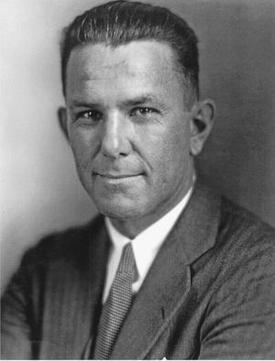
Lewis Woolford Hardage was an American college football player and college football and baseball coach.

The Florida–Tennessee football rivalry, also called the Third Saturday in September, is an American college football rivalry between the Florida Gators football team of the University of Florida and Tennessee Volunteers football team of the University of Tennessee, who first met on the football field in 1916. The Gators and Vols have competed in the same athletic conference since Florida joined the now-defunct Southern Intercollegiate Athletic Association in 1910, and the schools were founding members of the Southeastern Conference in 1932. Despite this long conference association, a true rivalry did not develop until the early 1990s due to the infrequency of earlier meetings; in the first seventy-six years (1916–91) of the series, the two teams met just twenty-one times. The Southeastern Conference (SEC) expanded to twelve universities and split into two divisions in 1992. Florida and Tennessee were placed in the SEC's East Division and have met on a home-and-home basis every season since. Their rivalry quickly blossomed in intensity and importance in the 1990s and early 2000s as both programs regularly fielded national championship contending teams under coaches Phil Fulmer of Tennessee and Steve Spurrier at Florida.

The 1996 Florida Gators football team represented the University of Florida in the sport of American football during the 1996 NCAA Division I-A football season. The 1996 season was the team's seventh under head coach Steve Spurrier. The Gators competed in the Southeastern Conference (SEC) and played their home games at Ben Hill Griffin Stadium on the university's Gainesville, Florida campus.
The 1914 Tennessee Volunteers football team represented the University of Tennessee in the 1914 Southern Intercollegiate Athletic Association football season. The team won the Southern Intercollegiate Athletic Association, the first championship of any kind for the Tennessee program. Winning all nine of their games, the 1914 squad was only the second undefeated team in Tennessee history. The 1914 Vols were retroactively awarded a national championship by 1st-N-Goal, though this remains largely unrecognized.
The 1966 Alabama Crimson Tide football team represented the University of Alabama in the 1966 NCAA University Division football season. It was the Crimson Tide's 72nd overall and 33rd season as a member of the Southeastern Conference (SEC). The team was led by head coach Bear Bryant, in his ninth year, and played their home games at Denny Stadium in Tuscaloosa, Legion Field in Birmingham and Ladd Stadium in Mobile, Alabama. They finished season undefeated with eleven wins, as SEC co-champions and with a victory over Nebraska in the Sugar Bowl.
The 1930 Alabama Crimson Tide football team represented the University of Alabama in the 1930 college football season. It was the Crimson Tide's 37th overall and 9th season as a member of the Southern Conference (SoCon). The team was led by head coach Wallace Wade, in his eighth year, and played their home games at Denny Stadium in Tuscaloosa, at Legion Field in Birmingham, and at the Cramton Bowl in Montgomery, Alabama. They finished the season with a perfect record, as Southern Conference champions and as national champions after they defeated Washington State in the Rose Bowl.

The Tennessee–Vanderbilt football rivalry is an American college football rivalry between the Tennessee Volunteers and Vanderbilt Commodores. They are both founding members of the Southeastern Conference (SEC). Vanderbilt and Tennessee have played 117 times since 1892. Tennessee leads the all-time series 78–33–5.
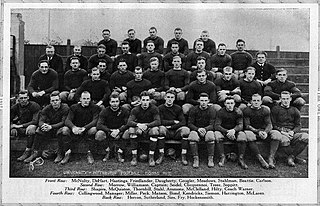
The 1915 Pittsburgh Panthers football team represented the University of Pittsburgh in the 1915 college football season. In his first season with the program, head coach Pop Warner led the Panthers to wins in all eight games and they outscored their opponents by a combined total of 247–19. Home games were held at Forbes Field, the ballpark of baseball's Pittsburgh Pirates.
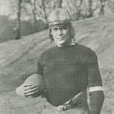
John Graham Vowell was an American football player for the Tennessee Volunteers, of the University of Tennessee. He was the school's first All-American. Vowell was inducted into the Tennessee Sports Hall of Fame for 2017.
The 1914 College Football All-Southern Team consists of American football players selected to the College Football All-Southern Teams selected by various organizations for the 1914 Southern Intercollegiate Athletic Association football season.

The 1906 College Football All-Southern Team consists of American football players selected to the College Football All-Southern Teams selected by various organizations for the 1906 Southern Intercollegiate Athletic Association football season. For some, the SIAA champion 1906 Vanderbilt Commodores football team made up the entire team. It would produce eight of the composite eleven. Owsley Manier was selected by Walter Camp third-team All-American. Vanderbilt won the SIAA championship.
Robert Medaris "Russ" Lindsay was a college football and baseball player for the Tennessee Volunteers of the University of Tennessee.
Robert Vance "Mush" Kerr was a college football player. After college, he was a prominent educator.
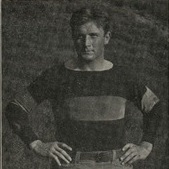
Farmer Kelly was a college football player, from Orlinda, Tennessee. He was later a county agent for the U. S. Department of Agriculture in Kentucky.
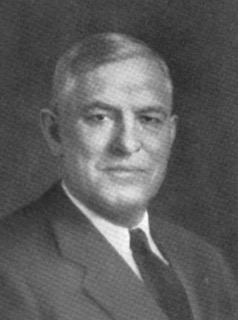
Bradley Walker was a Nashville attorney who, in his youth, was found to be naturally proficient at virtually any sport he tried, including football, baseball, track, boxing, tennis and golf— in all these sports he either set records or won championships or awards.
W. E. "Bill" May was a college football player.
References
- ↑ U.S., World War I Draft Registration Cards, 1917-1918 Registration State: Georgia; Registration County: Spalding; Roll: 1558567
- ↑ "Tennessee Total National Championships". College Football Data Warehouse. Archived from the original on January 17, 2010. Retrieved June 1, 2010.
- ↑ McMinn, Ed (July 24, 2007). God Bless the Vols: Devotions for the Die-Hard Tennessee Fan. p. 180. ISBN 9781416541899 – via Google Books.
- ↑ "Athletics". The University of Tennessee Record. 18 (5): 65. 1915 – via Google Books.
- ↑ Spalding's Official Football Guide. NCAA. 1915 – via Google Books.